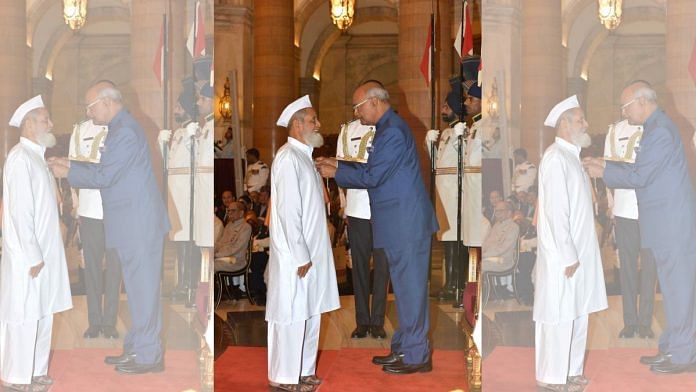When the Padma Shri awards were announced in 2018, folk singer Ibrahim Sutar’s native town of Mahalingpur in the Bagalkote district of Karnataka erupted in celebration. The festive mood was not restricted to his village. In neighbouring areas of Vijaypura, sweets were reportedly distributed among schoolchildren – a testament to the love and respect Sutar commanded.
The ‘Kannada Kabir’, as he was fondly called, was a scholar of both the Srimad Bhagavad Gita and the Quran, and he frequently spoke on the need for religious tolerance between Hindus and Muslims. Through his music and pravachanas, he would spread the word of unity and communal harmony across the state.
Known as the creator of the Bhavaikyate Bhajan Mela steeped in the Sufi tradition, Sutar started out as a Harikathe bhajan musician, performing in small towns and villages. He frequently entertained his audiences with tales from the Hindu and Islamic texts, always ending on a note of peace and the importance of personal ethics. Sutar also gave lectures in which he quoted extensively from a wide variety of biblical sources. A polyglot, he was fluent in Hindi, Kannada and Urdu.
Also read: Birju Maharaj—Kathak maestro started teaching at 13 years. He died with a song on his lips
The Sufi saint who believed in a syncretic culture
Born into a family of weavers in Karnataka’s Mahalingpur, Sutar had to leave school after sixth grade to support his family. There was an early spiritual awakening in his thoughts. While going to the Sadhu Maharaj temple for bhajans, he also served on a mosque committee that went from village to village encouraging worshippers to observe the fast by rising early. Sutar actively dedicated himself to the study of both the Hindu and Islamic scriptures and assembled a group of bhajan singers in Karnataka and Maharashtra to host the ‘Bhavaikyate Bhajana Mela’.
The performance followed a standard question-and-answer structure, with dasa saint hymns and vachanas inserted at regular intervals. Dasa are devotional hymns composed in honour of lord Vishnu, during medieval Bhakti period. They are sung in ragas of different types. Sutar would answer the questions using examples from the Ramayana, the Mahabharata, Islamic scriptures, and the lives of prophets. Called the torch-bearer of Sufism, he peppered his speeches with quotations from Sanskrit shlokas, Rahim’s and Kabir’s Dohe and saying of other saints. He awarded the Karnataka Rajyotsava in 1995 and the Padmashri in 2018 for “spreading social message through his bhajans for the last 44 years’.
Also read: Chidambaram Subramaniam—the force behind India’s green revolution who never took credit for it
Countering hate with love
Speaking at the 86th Sarva Dharma Sammelan in 2018, Ibrahim Sutar who had been conferred the Padma Shri that year, said: “practising the rituals on one’s religion and simultaneously respecting the practice the rituals and traditions of other religions is the true message for communal harmony.”
His statement was his lifelong ideology. In his lifetime, he donned many hats. Not only was he an accomplished musician, but also an activist who was concerned with the well-being of all.
In 1988, together with the people in his hometown, he constructed a road that stretched for nine kilometres. He had heard that two children had perished in the same house within a week due to lack of access to medical care because of poor road connectivity. In his sermons, he encouraged the local people to organise a ‘shrama dana’ to raise fund and build the road. The road was completed in a matter of weeks. A bus service to the remote village was authorised as a result of the community’s pleas for help.
Over the years, Sutar helped construct shelters for worshippers, marriage halls for the underprivileged, and educational institutions. Every year during the rainy season, he would give a series of talks titled ‘Shravankkondu Samaja Seve’, which in English stood for ‘social work for every Shravana month’. He is also reported to have led de-addiction campaigns and rallied against social ills such as the ‘devadasi‘ ritual — a religious practice under which teenage girls were married to a deity or a temple, and were often forced into prostitution.
In a 2018 interview to The New Indian Express, Sutar revealed how while observing Ramzan, he would often be reminded of the writings in the Vachana literature or the Bhagvad Gita. This propelled him to join a bhajan mandali. It is this understanding that led to him forming the ‘Bhavaikya Janapada Sangeeta Mela’ with seven other friends. The ‘Sangeet Mela’ was a group that sang devotional songs and gave pravachans (sermons). He believed that all religions led to one God and advocated against communalism and casteism.
Sutar passed away on 5 February 2022 due to cardiac arrest. He was 82. A state funeral was announced on his death.
(Edited by Anurag Chaubey)



